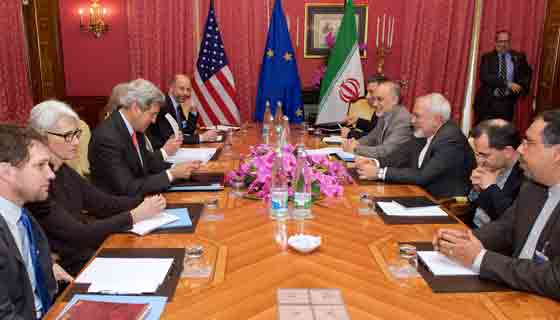Secretary of State John Kerry blasted Senate Republicans on Wednesday during testimony before the Senate Foreign Relations Committee.
Kerry, whose appearance before the committee was related to a use of military force authorization being debated in Congress, was asked about a letter that forty-seven Senate Republicans sent to Iran. The letter warned Iran’s leaders that any deal struck between President Barack Obama and Iran would be temporary in nature and subject to the whims of Obama’s successor.
The move was viewed as just the latest attempt by Congressional Republicans to sabotage sensitive nuclear disarmament negotiations between the Obama administration and Iran’s leadership.
Experts in the field called the letter — which was intended to directly interfere with sensitive negotiations — unprecedented in nature.
Newspapers across the country, including the conservative Wall Street Journal, condemned the letter. The New York Daily News went so far as to label the forty-seven senators who signed the letter as “TRAITORS” in bold and all caps on their front page. On social media, #47traitors was a top trending hash tag throughout Tuesday.
Below, we have Secretary of State John Kerry’s full reaction, as well as a copy of the letter that was sent to Iran:
My reaction to the letter was utter disbelief. During my twenty-nine years here in the Senate, I never heard of — or even heard of being proposed — anything comparable to this.
No one is questioning anybody’s right to dissent. Any senator can go to the floor any day and raise any of the questions that were raised in that. But to write to the leaders in the middle of the negotiations — particularly the leaders that they have criticized other people for even engaging with or writing to — to write them and suggest that they’re going to give a constitutional lesson — which by the way, is absolutely incorrect — is quite stunning.
This letter ignores more than two centuries of precedent in the conduct of American foreign policy.
Formal treaties obviously require the advice and consent of the United States Senate, that’s in the Constitution, but the vast majority of international arrangements and agreements do not. Around the world today, we have all kinds of executive agreements that we deal with: protection of our troops, the recent agreement we just did with Afghanistan, any number of non-controversial and broadly supported foreign policy goals. The executive agreement is a necessary tool of American foreign policy. It’s been used by presidents of both parties for centuries literally. It is recognized and accepted by Congress from the earliest period of American history.
Now, with respect to the talks, we’ve been clear from the beginning. We’re not negotiating a quote, ‘legally binding’ plan. We’re negotiating a plan that will have in it the capacity for enforcement. We don’t even have diplomatic relations with Iran.
The senator’s letter erroneously asserts that this is a legally binding plan. It’s not. It’s incorrect when it says that Congress can actually modify the terms of the agreement at any time. That’s flat wrong. You don’t have a right to modify an agreement reached executive to executive between leaders of a country.
Sure, can another president come in with a different attitude? No president I think — if this agreement meets its task and does what it’s supposed to do, in conjunction with China, Russia, France, Germany, Great Britain, all of whom are going to either sign off or not sign off on an agreement. I’d like to see the next president if all of those countries had said this is good and it’s working turn around and just nullify it on behalf of the United States. That’s not going to happen.
So, I have to tell you that knowing what we know about this, [the letter] risks undermining the confidence that foreign governments in thousands of important agreements commit to between the United States and other countries. And it purports to tell the world that if you want to have any confidence with your dealings with America, they have to negotiate with 535 members of Congress. That is both untrue and profoundly a bad suggestion to make.
But aside from the legalities, this letter also raises questions of judgment in policy. We know that there are people in Iran opposed to any negotiated arrangement with the P5+1. We know that a comprehensive solution is not going to happen if Iran’s leaders are not willing to make hard choices about the size, scope and transparency of their nuclear program. We know that a nuclear armed Iran is unacceptable.










